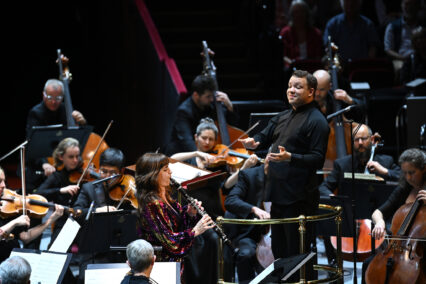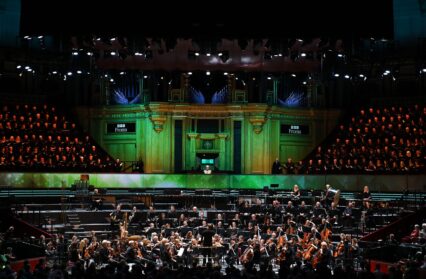David Truslove enjoys two successive evenings with BBC National Orchestra and Chorus of Wales at the Royal Albert Hall which brought American and Russian offerings that, in their various ways, revealed different qualities of this acclaimed orchestra, not least its versatility.
Prom 21 saw the world premiere of Nova Plexus by Derrick Skye (born Los Angeles, 1982). It’s a work inspired by the Sun which, according to the composer, “immerses the listener in a sonic world illuminated by the sun’s resplendent elegance and invigorating might”. Fine words, but the “spectacular” effects we were promised barely broke the surface of an episodic extravaganza that drew on west African, Persian and Balinese musical traditions. Fascinating as these were, and with the orchestra enlarged to include 8 suspended gongs, electric bass, electric guitar and synthesiser, the work’s linear progress relied on expanding and contracting sonorities, its underlying rhythmic impetus doing little to conjure a “multitude of solar emissions”. Notwithstanding Alice Neary’s poignant cello solo and a committed performance from all concerned, the overall result felt earthbound, the sun’s rays never quite reaching this listener. At 18 minutes, this extravagant BBC commission outstayed its welcome.
Leaving a more rewarding impression was the Clarinet Concerto by Aaron Copland. Written for the ‘King of Swing’ Benny Goodman and completed in 1948, the work unfolds from a long-breathed lyricism of spare textures and azure skies before yielding to the jazzy realm of New York night clubs – the two parts linked by a cadenza. Playing with silky tone and then unbuttoned verve, the Belgian soloist Annelien Van Wauwe brought considerable eloquence and panache to this score. Under Bancroft’s fluid direction his slimmed down orchestra – strings, piano and harp – formed a sensitive partnership for an account underlining poise and exuberance, always governed by a forward momentum.
After Copland’s economical score, the platform filled for what was to be the highlight of the evening – John Adams choral symphony Harmonium (1981). On stage there were also over 200 voices drawn from the BBC National Chorus of Wales and Crouch End Festival Chorus ready to roar out settings of John Donne and Emily Dickinson. It’s hard to decide what impressed me most – the work itself, American minimalism showcased on a maximal scale, Bancroft’s masterly control of its complex metrical changes, or the sheer vocal punch of the chorus that ignited in “Wild Nights”, sung with unflinching confidence and allied to parade ground precision. That the words are sliced into meaningless segments and syllables endlessly repeated is neither here nor there, the gist of the poem is implicit in the pulsating rhythms and accumulating excitement. Who needs to mainline on speed when you have Adams’ shimmering harmonies and hypnotic rhythms? If time seemed to stand still in the choral recitation of “Because I Could Not Stop For Death”, there was no lack of energy and forward movement in the “Negative Love” (John Donne), its kinship with Steve Reich and Philip Glass clear from the off. Altogether, a performance that demonstrated Bancroft’s inspirational direction and the meticulous preparation of his forces.

The following evening was a different story. Given without an interval and lasting some 75 minutes, Prom 22 would have benefited from an overture. Something from Borodin, Glinka or Shostakovich would have been suitable. If one did not already feel short-changed, it came as a surprise that Isata Kanneh-Mason (making her proms debut) offered no encore. But she wowed the audience for her rendition of Prokofiev’s Piano Concerto No. 3 – the most performed and crowd pleasing of the composer’s five piano concertos, a work of Classical poise allied to capricious expression.
Proceedings unfolded from a noble clarinet solo to reveal a movement full of light and shade. There were moments of delicacy and excitement, its pyrotechnics understated its joie de vivre well served if not over indulged. Kanneh-Mason had all the notes easily under her fingers, despatching even the most demanding passages without appearing taxed. At times sardonic writing felt underplayed making the Finale feel somewhat safe though not joyless. The central episode’s ‘big tune’ was nicely delivered (strings warm and affectionate here, if not always lustrous), though the terse interludes left a stronger imprint. That said, the closing pages had a momentum that was maintained through to the adrenalin-filled final bars. Of the second movement where, to quote David Fanning, “the piano masquerades in turn as lover, acrobat athlete, nocturnal poet and gymnast”, Kanneh-Mason gave a well-defined traversal of its variations without any obvious attempt at over-characterisation. A cohesive reading here in which soloist and conductor underlined the dreaminess and tenderness of the fourth variation (ear-catching horns here) and throughout finding well-judged tempi.
The Tchaikovsky symphony that followed was notable for its restraint, with Bancroft more interested (so it seemed from within the hall) in pursuing a well-behaved, neat and tidy performance than exploring the work’s dramatic possibilities. Yet the composer had wanted the work to be played “with passion and desire”. Instead, Bancroft providing a resolute account, passions generally withheld so that brass and timpani were seldom allowed a head of steam. The opening was admirably brooding with smoothly rendered clarinets introducing Fate, thereafter the main Allegro con anima unfolded with bracing tempi, with mood changes mostly well integrated into a sweeping account. Tim Thorpe’s lovely horn solo brought refinement to the Andante, aided and abetted by warmth of string tone and eloquent woodwind contributions, with Fate’s presence well defined. It was in the Waltz movement where the BBCNOW was at its most persuasive, playing with a light-as-air quality with impish woodwind providing a dash of humour before the ominous premonitions returned in the closing bars. The Finale had intimations of being momentous, and the spirited Allegro brought hints of edge of seat drama, Fate vanquished but without any fist shaking.
At the symphony’s UK premiere at London’s Queen’s Hall in 1895 under Arthur Nikisch, The Times commented how Tchaikovsky’s music suggested “the ungovernable impulses commonly attributed to the Slavic temperament”. A dash of those “impulses” would have been more than welcome here. A solid rendition then, the orchestra jubilant, if not thunderously defiant.
Prom 21 (Monday 31st July)
Derrick Skye – Nova Plexus (BBC Commission world premiere)
Aaron Copland – Clarinet Concerto
John Adams – Harmonium
BBC National Orchestra of Wales, BBC National Chorus of Wales, Crouch End Festival Chorus, Ryan Bancroft (conductor), Annelien Van Wauwe (clarinet)
Prom 22 (Tuesday 1st August)
Prokofiev – Piano Concerto No. 3
Tchaikovsky – Symphony No. 5
BBC National Orchestra of Wales, Ryan Bancroft, Isata Kanneh-Mason (piano)
More information on the BBC Now Prom series is available through their website.











